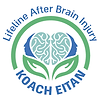Understanding Aphasia
What is Aphasia?
Aphasia is a communication disorder that affects a person’s ability to speak, understand language, read, or write. It occurs when the language processing areas of the brain are damaged, often due to a stroke, brain injury, infection, or a neurological condition. Aphasia does not impact intelligence. Though they may not be able to communicate easily, people with aphasia still think, feel, and understand the world as they always have; they simply struggle to express themselves in words.
Aphasia can range from very mild to extremely severe, sometimes making communication nearly impossible. It may affect just one aspect of language, such as recalling the names of objects, forming sentences, or reading. More often, however, multiple language abilities are impacted, while some communication pathways remain open, allowing for limited but meaningful exchanges for those with aphasia and their loved ones.
Treatment for aphasia often involves speech therapy, the development and practice of defined communication strategies, and support from loved ones. While recovery varies, many individuals improve with practice, patience, and the right resources.
Aphasia can be frustrating, but it doesn’t have to be isolating. With awareness, understanding, and support, people with aphasia can continue to lead meaningful and connected lives.
Types of Aphasia
Additionally, aphasia can present in many different ways, and not everyone fits neatly into a specific category. Some language difficulties may occur on their own, such as challenges with reading (alexia) or both reading and writing (alexia and agraphia), often following a stroke. In many cases, severe difficulty with numbers and calculation accompanies aphasia, yet some individuals retain strong math skills despite significant language loss.
Signs of Aphasia
Aphasia affects language in different ways, and its signs can vary depending on the type and severity of the condition. Common signs include:
-
Difficulty finding words – Struggling to recall the right words, even for familiar objects or people. Speech may include pauses, substitutions, or vague descriptions instead of specific words.
-
Trouble speaking – Speech may be slow, halting, or grammatically incomplete, with only key words used instead of full sentences. Some people may repeat the same words or phrases unintentionally.
-
Fluent but meaningless speech – Some individuals speak in full sentences that may sound fluent but lack meaning, contain incorrect words, or be difficult to understand.
-
Problems understanding language – Difficulty following conversations, especially when speech is fast or complex. People may struggle to grasp spoken or written instructions.
-
Reading and writing challenges – Trouble reading aloud, understanding written text, spelling words, or writing coherent sentences.
-
Difficulty with numbers and math – Problems with counting, basic arithmetic, or understanding numerical concepts, often occurring alongside language difficulties.
Recognizing these signs of aphasia early can help individuals get the right support and therapy to improve their ability to communicate.











